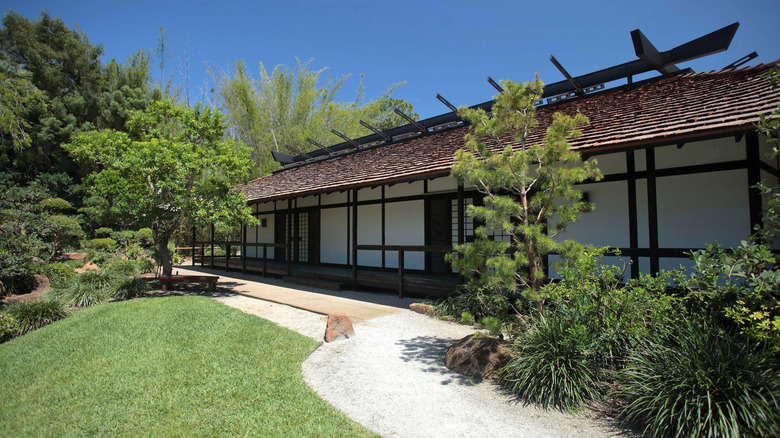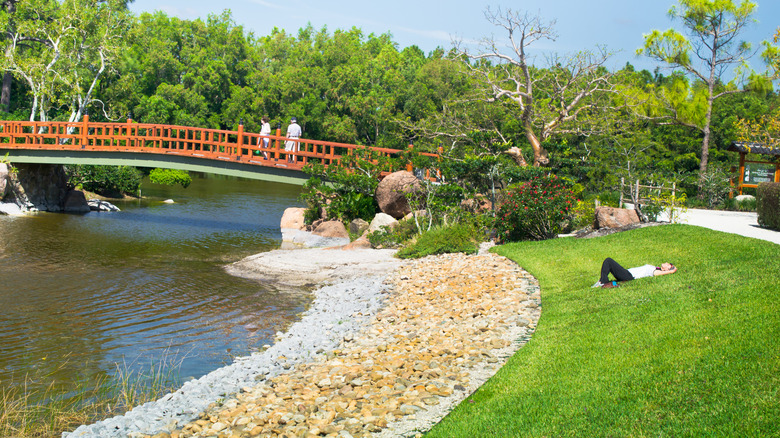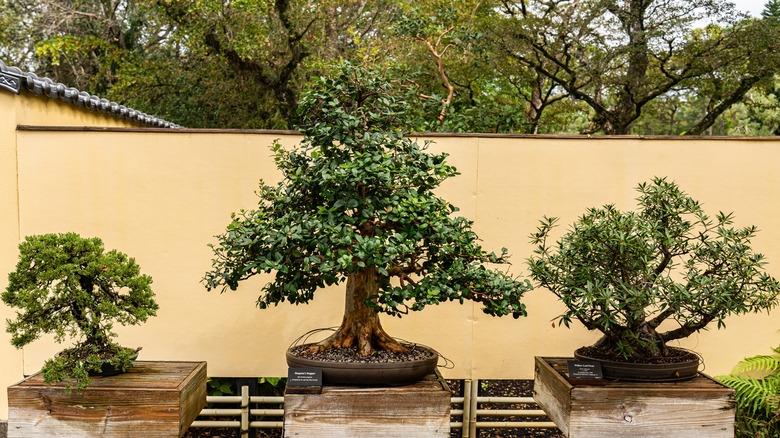One Of Florida's Most Underrated Tourist Spots Is A Japanese-Inspired Escape Into Nature
When you picture South Florida, you might think of its beaches or golf courses, but you wouldn't necessarily envision strolling through an authentic Japanese garden. As its name implies, however, that's one activity offered at the Morikami Museum and Japanese Gardens in Delray Beach. Since 1977, the museum has been welcoming visitors to what 24/7 Tempo calls Florida's most underrated attraction (via iHeartMedia). It all started with a donation of land from one George Sukeji Morikami, the last remaining settler from a local Japanese farming colony, which grew pineapples on land that would become part of nearby Boca Raton back in the early 1900s.
As a native South Floridian who now lives in Tokyo, my first real exposure to Japanese culture came from an elementary school field trip to the Morikami Museum. It's the kind of place where your kids could learn that "Ohio" isn't just a U.S. state but also the sound of "Good morning" in Japanese ("Ohayō," or, more politely, "Ohayō gozaimasu"). They might also pick up some basic customs, like how it's traditional to bow and avoid the common greeting of handshakes in Japan.
If your family's firsthand experience with the culture is limited to Publix sushi or the Japan Pavilion in Epcot, this might be a chance to broaden their horizons — or your own. At the Morikami Museum, you can take a walk through Japanese history both indoors and outdoors, exploring gardens themed to six different time periods. Here, you can escape the bustle of Florida's more touristy spots in a peaceful setting where there's often beauty to be found in the most overlooked details.
Visit the Morikami Museum and Japanese Gardens
The permanent collection at the Morikami Museum is devoted to the Yamato farming colony, including Sukeji Morikami, who added the Americanized name "George" to his name when he immigrated to Florida. Photographs, documents, and other historical artifacts track how the farmers helped this part of Palm Beach County form an unlikely connection to Japan. As part of its broader focus on visual culture, the museum also collects arts and crafts, such as cat-inspired prints from Inagaki Tomoo and ceremonial facemasks used in Japanese festivals.
Designed with input from a Kyoto grand master, there's a Japanese tea house on display in the museum as well. Outside, the first of the museum's six gardens was inspired by ones in Kyoto during the Heian Period, when the city (then known as Heian-kyō) served as Japan's capital. The Shinden Garden, as it's called, takes visitors across arched bridges and two landscaped islands in the middle of a serene pond. On the other side of the pond and its waterfalls, there are examples of an early rock garden with a dry cascade and a late rock garden with raked gravel.
Before that, you'll pass through the Paradise Garden, which has a path twisting along the pond's perimeter. A stone pagoda marks the Hiraniwa Flat Garden, while the Modern Romantic Garden incorporates contemporary features like stepping stones, fountains, and flowers. There's also a bonsai walk on the museum grounds, and while you won't find signs identifying any of the other plants, the museum offers an exhaustive 110-page guide to them online.
Check out special exibitions and dine at the Cornell Cafe
In addition to its permanent collection, the Morikami Museum features periodic special exhibitions, which rotate in and out every few months. The museum's 2024 exhibitions showcased everything from bamboo light installations to the architecture of Neo-Tokyo in the classic anime film "Akira." Ducking into one of these exhibitions could be a good option if you find yourself in Florida on a rainy summer day when it doesn't quite live up to its "Sunshine State" nickname.
For a hands-on experience at the Morikami Museum, you can register for workshops in things like taiko drumming and traditional Japanese tea ceremonies. The Morikami Theater also hosts tea ceremony demonstrations one Saturday per month. If you're traveling with a larger group of 15 or more kids or adults, you can schedule a docent-led tour of the museum and gardens from October to mid-May.
Before you leave the Morikami Museum, you may want to grab lunch at the Cornell Cafe. It serves Pan-Asian cuisine, including Japanese staples like bento boxes, miso soup, edamame, and unagi don, or eel bowls. Naturally, sushi is on the menu, too, though it's only a few American selections, like the spicy tuna roll (or Canadian selections, if you believe the news that the California roll was first created at a restaurant in Vancouver). While riding an Amtrak train out of Delray Beach is slower than riding a bullet train out of Tokyo, the cafe could at least give you a taste of what it's like picking out station bento boxes for a journey across Japan.


